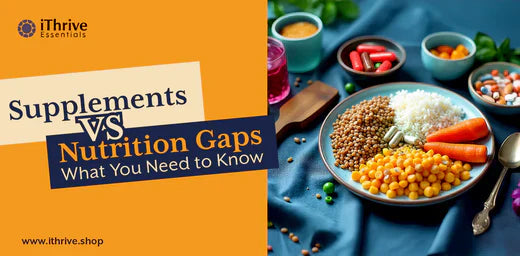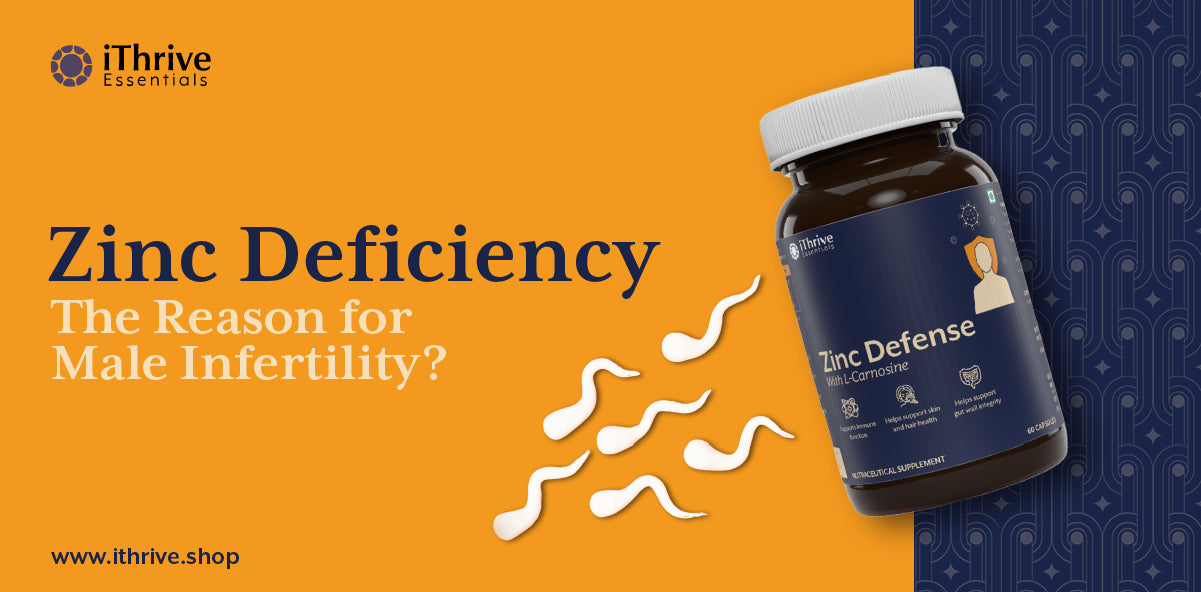
Can Supplements Fill the Gaps in Your Diet?
In today's fast-paced world, many of us are striving for better health, but despite our best efforts to eat a well-balanced diet, we might still find ourselves missing key nutrients. The reality is, that even the most carefully planned meals can leave gaps in our nutrition. With modern farming, fast-paced lifestyles, and the demands of the environment, getting all the vitamins, minerals, and other essential nutrients your body needs from food alone has grown increasingly difficult. Supplements, of course, fill the gap in this regard. But do supplements fill the gaps in our diet? Let's find out how supplements can support your health and whether they are a necessary addition to your daily routine.
Why Our Diet Falls Short

The days when a freshly picked apple or a bowl of spinach could meet your daily nutrient requirements are long gone. Modern farming practices, overuse of fertilizers, and environmental degradation have all taken their toll on the nutritional quality of our food.
-
Intensive farming has stripped the soil of essential minerals like magnesium and zinc. This means the crops that are grown today are less nutrient-dense than they were a few decades ago.
-
Pesticides, metals, and other pollutants can further compromise food quality, making it harder to rely solely on natural sources.
-
Fast food, processed meals, and restrictive diets (such as vegan or keto) are leading to a lack of crucial vitamins and minerals in the general population.
-
In other words, even the most health-conscious people may find that their diet is not adequately supplying their body with what it needs. That's where supplements can be really useful.
Let me explain with a simple example :
In the case of magnesium, even magnesium-rich foods (e.g., spinach, nuts, seeds) may not provide enough bioavailable magnesium, as only a portion is absorbed in your body when you eat these. The recommended daily allowance (RDA) for magnesium is 440 mg per day and it will be very difficult to obtain that simply from food. For eg. 5 ounces of almonds (140 grams) contain about 400 mg of magnesium. This is equivalent to eating about 100 almonds every day, which is not the most ideal thing to do. Also, you’d need about 2.5 cups of cooked spinach daily (around 450 grams or almost 1 pound of spinach) to get 400 mg elemental magnesium. Raw spinach cooks down significantly, so consuming 2.5 cups of cooked spinach means starting with a huge amount of raw spinach—almost a full bag or more, which is again very difficult to do. In these cases, magnesium supplements come in handy. Only one scoop of a good magnesium bisglicinate provides about 440 mg of elemental magnesium, which easily fulfills your daily needs.
Supplements to Fill Nutritional Gaps

Supplements are not alternatives to a healthy diet, but rather useful reinforcements. Supplements are the final puzzle piece that completes your picture of nutrition. Here is how they help:
- Helps fight deficiencies: Most individuals today suffer from deficiencies like vitamin D, magnesium, or omega-3 fatty acids, even if they do take good care of themselves about what they eat. There can be some special diets in which people go on like the Vegan diet, carnivore diet, keto diet, etc in which individuals can develop nutrient deficiencies. These gaps can be filled by supplementation.
- Boosts health: Pregnant women, athletes, and older adults often have unique nutritional needs. For instance, prenatal vitamins are critical for fetal development, and calcium supplements can help seniors maintain bone health.
-
Fulfil the essential gap: If you’re vegetarian or vegan, supplements like B12 and iron can help make up for nutrients often missing from plant-based diets.
Can Supplements Replace Food?
The short answer? No.
Food has an orchestra of nutrients, which are fiber, phytonutrients, and antioxidants, among others, and supplements can't replace that. Whole foods provide the balance and synergy necessary for your body to absorb and use nutrients correctly. So, when you eat an orange, you receive vitamin C plus fiber and flavonoids that enhance its use. The same isn't true when you take a vitamin C supplement.
However, supplements remain very important in today's world. They fill in the gap between what we consume and what we require, and when it comes to food, alone is not enough to help achieve our overall health.
Role of Supplements in a Healthy Diet

Supplements are not a "one-size-fits-all" phenomenon. It depends on your requirements and your lifestyle. Here is how to use them best:
1. Identify Your Gaps
First, understand where your diet might be falling short. Common dietary gaps include:
-
Vitamin D: Most people do not get enough sun exposure to produce this important vitamin. Infections can also increase the need of vitamin D.
-
Magnesium: In nuts, seeds, and leafy greens but under consumed. You need to eat too many of these foods to fulfil your daily magnesium intake. Taking a supplement really helps.
-
Omega-3 Fatty Acids: Missing in diets lacking fish or sea foods.
-
Iron: Particularly for menstruating women or vegetarians or vegans.
2. Select Good Supplements
Not all supplements are the same. Opt for third-party testing and avoid products with unnecessary fillers or additives. Look to trusted brands for the best choices. Continue eating nutrient-dense foods and add supplements for added nutritional boost.
Best Supplements for a Balanced Diet
If you’re ready to explore supplements, here are some of the best options to consider:
-
B-Complex: A good starting point to cover general deficiencies. Try iThrive Essentials Active B complex
-
Vitamin D: Essential for bone health, immunity, and mood regulation. Try iThrive Essentials Vitamin D3+K2
-
Omega-3 Fatty Acids: Support heart, brain, and joint health. Try iThrive Essentials Krill Oil
-
Magnesium: Helps with muscle function, sleep, and stress management. Try iThrive Essentials Magnesium Bisglycinate
-
Probiotics: Improves gut health and digestion. Try iThrive Essentials Probiotics with prebiotics
-
Zinc: Boosts immunity and supports skin health. Try iThrive Essentials Zinc Defense.
How to Identify Gaps in Your Diet
Do you need supplements? Start by:
Blood Tests:
- Sometimes, no matter how good we are at monitoring our meals or striving for balance, nutrient deficiencies still occur. This is where blood tests come in. Getting a professional blood test is the most accurate way of identifying specific deficiencies and knowing where your diet is lacking.
- Blood tests provide precise information about nutrient levels in your body, from vitamin D and B12 to iron and magnesium.
- Some nutrient deficiencies may not show obvious symptoms until they are more severe. For instance, low Vitamin D levels can impact bone health, immune function, and even mood, but you may not feel the effects until much later. Blood tests can detect such deficiencies early, giving you time to correct them.
At iThrive, we have our RCA program, which involves a full panel of blood testing to identify deficiencies and underlying imbalances. If you're experiencing fatigue, digestive issues, or even unexplained symptoms like hair loss or poor skin health, an RCA can help identify the root cause.
Consulting Experts:
A nutritionist can guide your supplement choices. While tracking meals and getting blood tests provide useful data, it's important to get expert guidance when it comes to making changes to your diet or adding supplements. This is where working with a functional nutritionist or healthcare provider becomes crucial.
-
Nutritionists will interpret the meal tracking results and blood tests and recommend a supplement suitable for you.
-
Not all supplements are good for everybody. For instance, too much vitamin may cause undesirable effects on your body. A nutritionist will ensure that the supplement is safe and effective on your body with regard to your health profile.
-
They will also assist you in monitoring progress over time, adjusting your supplement routine when necessary, and providing lifestyle tips for maintaining healthy living.
Are Supplements Necessary for Health?
The diets today, hectic lifestyles, and environmental challenges make it hard to meet nutritional requirements with food alone. Supplements provide that focused support to keep your body operating at its best.
So ask yourself: Are you providing your body with everything it needs to perform at its best? If not, then it's probably time to start contemplating supplements that will elevate your health journey. After all, your health is an investment, and properly selected supplements may offer a great return.



Leave a comment
This site is protected by hCaptcha and the hCaptcha Privacy Policy and Terms of Service apply.